“Stairs’ writer urges everyone to leave ‘life lessons’ memoir with will—Tom Hall
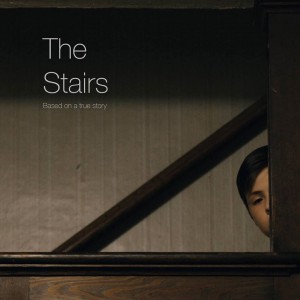 This Friday past was Holocaust Remembrance Day, and marking the occasion at the Second Annual Bonita Springs International Film Festival was a 10-minute short titled The Stairs.
This Friday past was Holocaust Remembrance Day, and marking the occasion at the Second Annual Bonita Springs International Film Festival was a 10-minute short titled The Stairs.
The film is a poignant recounting by a Holocaust survivor of his most harrowing day at Auschwitz. He’s unable to tell this story to his son face to face, but he records his account of the day he arrived at the death camp and has the cassette tape mailed to his son after he’s died. But it turns out that the boy has already heard is father’s story. You see, he sat on the stairs as a ten-year-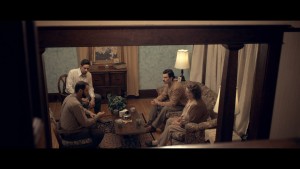 old boy listening to his father tell the tale to company he and his mom had invited over to their house one the evening.
old boy listening to his father tell the tale to company he and his mom had invited over to their house one the evening.
“That 10-year-old boy was me,” writer Mort Laitner told the Bonita Springs International Film Festival crowd who’d just seen the film. Ten years ago, 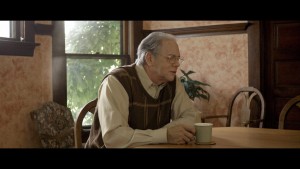 Laitner codified that experience in an eponymous short story that he had made into a film some 18 months ago.
Laitner codified that experience in an eponymous short story that he had made into a film some 18 months ago.
“Right now, I’m converting the screenplay for this 10-minute film into a feature film.”
Based on these experiences, Laitner recommends that everyone  write a 10 to 20 page memoir describing what they’ve learned in life. “Place it with your will in your safe deposit box so that it can be passed on to your kids or relatives,” Mort urges. “That way, they can learn from your life.”
write a 10 to 20 page memoir describing what they’ve learned in life. “Place it with your will in your safe deposit box so that it can be passed on to your kids or relatives,” Mort urges. “That way, they can learn from your life.”
The Stairs was shot in Portland, Oregon in just a single day. 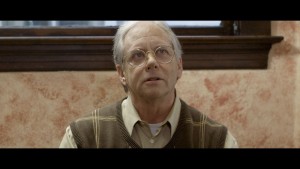 Filming began at 11 in the morning and continued until 11 that night. “Out of all that footage, we got 10 minutes,” he says ruefully of the filming/editing process.
Filming began at 11 in the morning and continued until 11 that night. “Out of all that footage, we got 10 minutes,” he says ruefully of the filming/editing process.
Laitner also has some advice for fellow filmmakers – exercise patience during the editing process. “My editor promised he’d 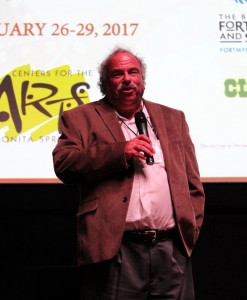 be done in sixty days. When I hadn’t heard anything after 120 days, I started freaking out. But 30 days later, I got my movie. Everything I’d read about filmmaking said under no circumstances bother the editor. By not bothering him, I got a really well done edit job and I’m very happy with the outcome.”
be done in sixty days. When I hadn’t heard anything after 120 days, I started freaking out. But 30 days later, I got my movie. Everything I’d read about filmmaking said under no circumstances bother the editor. By not bothering him, I got a really well done edit job and I’m very happy with the outcome.”
The benefits of homework and preparation cannot be overstated either. “Dennis Fitzpatrick played my father in the film. I spent an hour the day before telling him about my father, and when he started manipulating his glasses as he sat at the table and began telling my father’s story, a 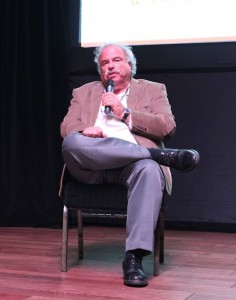 tear came out of my eye because my father came back to me in that scene.” It’s impossible to put a price on authenticity, but your actors are only as good as the script and backstory you give them.
tear came out of my eye because my father came back to me in that scene.” It’s impossible to put a price on authenticity, but your actors are only as good as the script and backstory you give them.
Laitner sees it as his duty to pass his father’s message along to new generations. He does that not only through the film, but by talking to audience members at every film festival he’s able to attend. To date, The Stairs has been juried into 21 film festivals in seven different countries. Mort has personally attended seven of them, and he continues to be moved when people ask to shake his hand and share with him stories they’ve heard from Holocaust survivors they know or have met in their condos, schools and communities.
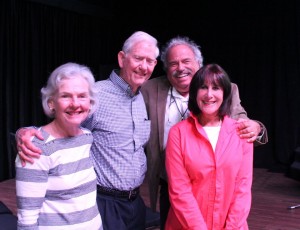 “I see that even with people who have very little knowledge of the Holocaust that I’ve opened their eyes a little bit,” he adds with pride mixed with satisfaction. “Hopefully that will inspire them to learn more on their own.”
“I see that even with people who have very little knowledge of the Holocaust that I’ve opened their eyes a little bit,” he adds with pride mixed with satisfaction. “Hopefully that will inspire them to learn more on their own.”
As Holocaust Remembrance Day underscores, it’s never too late for people to educate themselves about the dangers of targeting particular cultures or e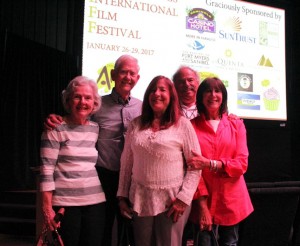 thnic groups. For more on this aspect of the film, read here.
thnic groups. For more on this aspect of the film, read here.
January 29, 2017.
About the Author

